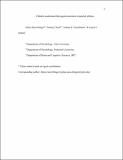Children understand that agents maximize expected utilities.
Author(s)
Jara-Ettinger, Julian; Floyd, Sammy; Tenenbaum, Joshua B.; Schulz, Laura E.
DownloadExpectedUtilities_Final.pdf (950.0Kb)
OPEN_ACCESS_POLICY
Open Access Policy
Creative Commons Attribution-Noncommercial-Share Alike
Terms of use
Metadata
Show full item recordAbstract
A growing set of studies suggests that our ability to infer, and reason about, mental states is supported by the assumption that agents maximize utilities—the rewards they attain minus the costs they incur. This assumption enables observers to work backward from agents’ observed behavior to their underlying beliefs, preferences, and competencies. Intuitively, however, agents may have incomplete, uncertain, or wrong beliefs about what they want. More formally, agents try to maximize their expected utilities. This understanding is crucial when reasoning about others’ behavior: It dictates when actions reveal preferences, and it makes predictions about the stability of behavior over time. In a set of 7 experiments we show that 4- and 5-year-olds understand that agents try to maximize expected utilities, and that these responses cannot be explained by simpler accounts. In particular, these results suggest a modification to the standard belief/desire model of intuitive psychology. Children do not treat beliefs and desires as independent; rather, they recognize that agents have beliefs about their own desires and that this has consequences for the interpretation of agents’ actions.
Date issued
2017-11Department
Massachusetts Institute of Technology. Department of Brain and Cognitive SciencesJournal
Journal of Experimental Psychology: General
Publisher
American Psychological Association (APA)
Citation
Jara-Ettinger, Julian et al. “Children Understand That Agents Maximize Expected Utilities.” Journal of Experimental Psychology: General 146, 11 (November 2017): 1574–1585 © 2018 American Psychological Association
Version: Author's final manuscript
ISSN
1939-2222
0096-3445